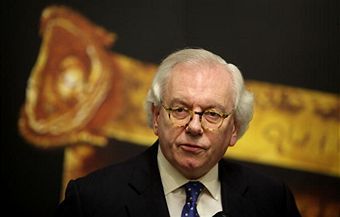 Public Enemy Number One, the unlikely figure of Dr David Starkey, is back in the papers;
this time writing in the
Telegraph to meet the cacophonous heckles that followed his appearance on Newsnight. Starkey begins with a viperous assault on Ed Miliband’s view that his comments were
“disgusting and outrageous”, pointing out that black educationalists Tony Sewell and Katharine Birbalsingh broadly agree with him.
Public Enemy Number One, the unlikely figure of Dr David Starkey, is back in the papers;
this time writing in the
Telegraph to meet the cacophonous heckles that followed his appearance on Newsnight. Starkey begins with a viperous assault on Ed Miliband’s view that his comments were
“disgusting and outrageous”, pointing out that black educationalists Tony Sewell and Katharine Birbalsingh broadly agree with him.
Starkey then goes on to restate his position. The summer of discontent has revealed the “different patterns of integration at the top and bottom of the social scale.” He
explains:
The root of their disaffection is a perceived lack of opportunity and the death of aspiration, but Starkey also alights on another issue: the absence of a completely cohesive national identity. This afflicts the black and white working classes because people can’t aspire to something to which they don’t belong.‘At the top, successful blacks, like David Lammy and Diane Abbot, have merged effortlessly into what continues to be a largely white elite: they have studied at Oxbridge and gone on to Oxbridge-style careers, such as that of an MP. But they have done so at the cost of losing much of their credibility with blacks on the street and in the ghettos. And here, at the bottom of the heap, the story of integration is the opposite: it is the white lumpen proletariat, cruelly known as the “chavs”, who have integrated into the pervasive black “gangsta” culture: they wear the same clothes; they talk and text in the same Jafaican patois; and, as their participation in recent events shows, they have become as disaffected and riotous.’
This is the fault, Starkey says, of the liberal elites’ reaction to Enoch Powell’s “Rivers of Blood” speech more than 40 years ago. He writes:
This common identity is forged by the deliberate choice to stand aloof from society and its norms, but it compounds their disenfranchisement. Starkey quotes Lindsay Johns, the mixed-race writer and mentor, who says that ‘“this insulting and demeaning acceptance” of a fake Jamaican – or “Jafaican” – patois. “Language is power”, Johns writes, and to use “ghetto grammar” renders the young powerless.’‘Unfortunately, the speech and still more the reaction to it, are also central to any proper understanding of our present discontents. For Powell’s views were popular at the time and the London dockers marched in his support. The reaction of the liberal elites in both the Labour and Tory parties, who had just driven Powell into the wilderness, was unanimous: the white working class could never be trusted on race again. The result was a systematic attack over several decades: on their perceived xenophobic patriotism, on symbols like the flag of St George, even – and increasingly – on the very idea of England itself. The attack was astonishingly successful. But it left a void where a sense of common identity should be. And, for too many, the void has been filled with the values of “gangsta” culture.’
Starkey is clear as to the solution to the malaise. Elites are not politically correct; they’re politically petrified. Their stout refusal to engage with the issues that Powell expressed has allowed this underclass to form and subsist. He says: “For the other pernicious legacy of the reaction to Powell has been an enforced silence on the matter of race. The subject has become unmentionable, by whites at any rate.”
Society cannot function without reciprocity. Starkey says, “I must be as free to comment on problems in the black community as blacks are to point the finger at whites, which they do frequently, often with justice.”
It’s a reasonable point, but one with huge attendant difficulties. Britain’s malaise is a cultural problem; but Starkey’s language, and indeed the language of the whole debate, is largely couched in the racially-loaded terminology of black and white. Starkey’s reasonable point could be lost in the shrill that those words elicit.






Comments